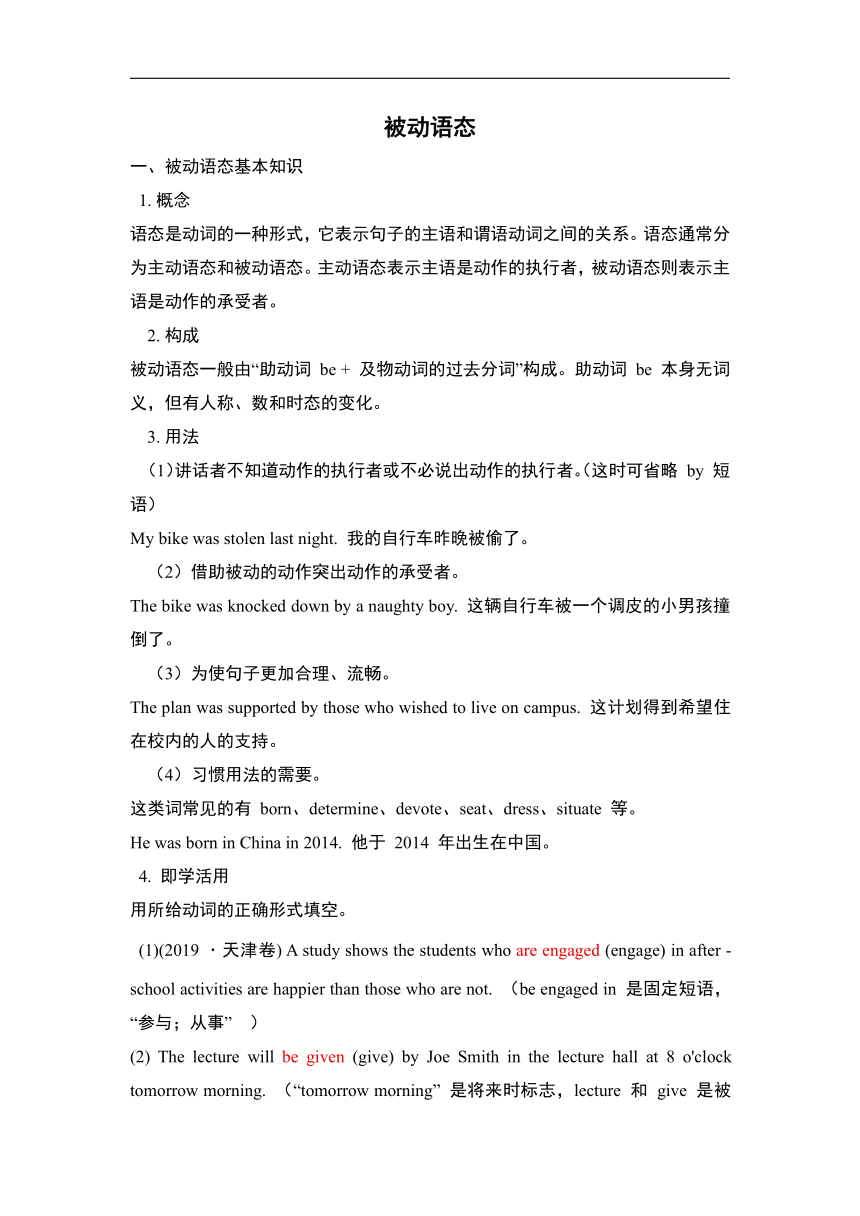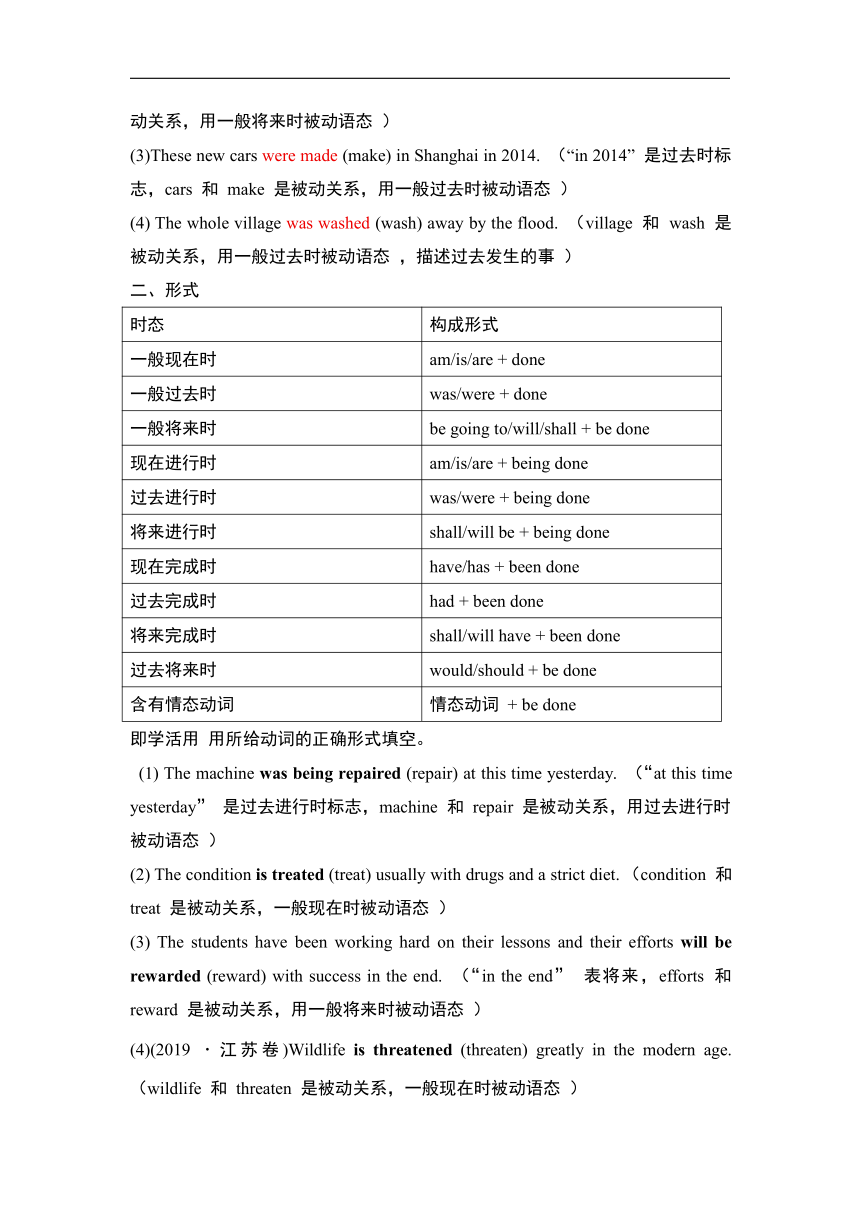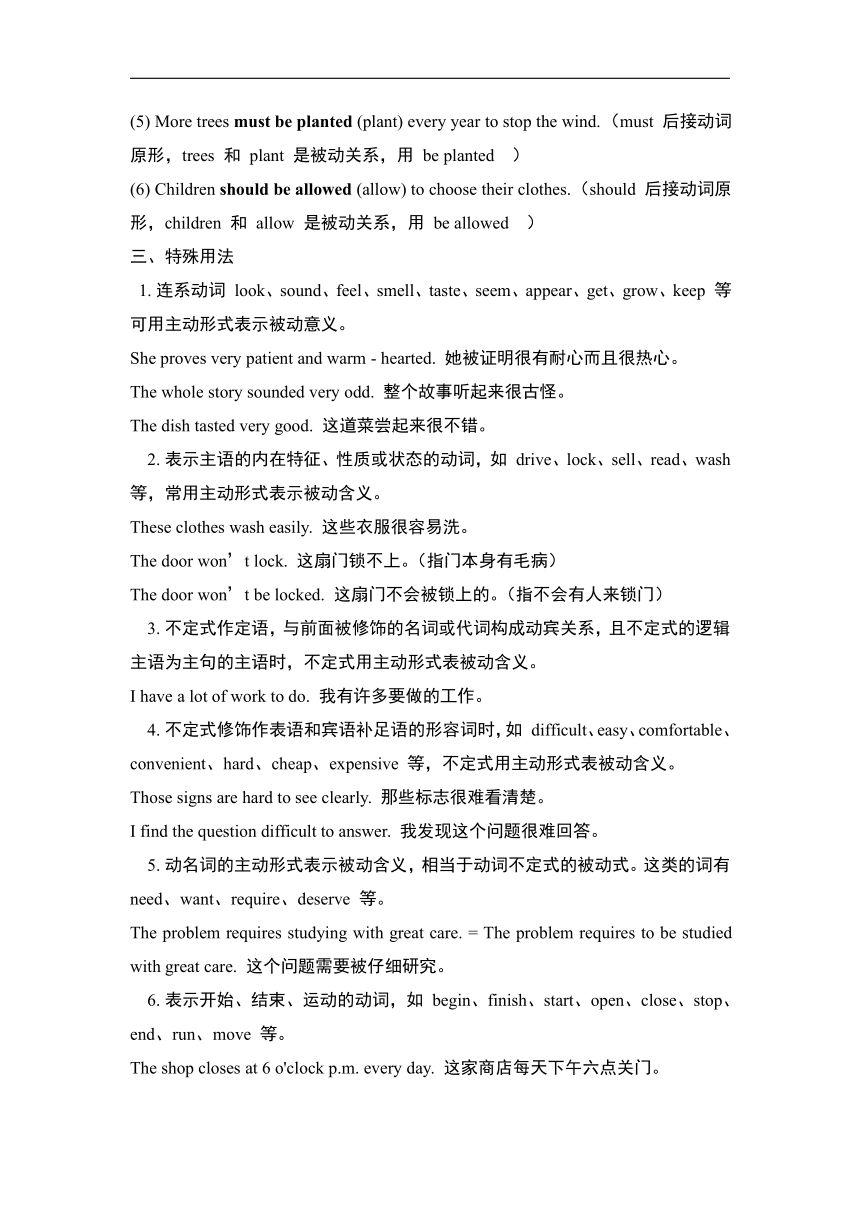Unit 3 Celebrations Lesson 1 Spring Festival 被动语态 导学案(含答案)-2025-2026学年高中英语北师大版(2019)必修第一册
文档属性
| 名称 | Unit 3 Celebrations Lesson 1 Spring Festival 被动语态 导学案(含答案)-2025-2026学年高中英语北师大版(2019)必修第一册 |

|
|
| 格式 | docx | ||
| 文件大小 | 31.1KB | ||
| 资源类型 | 教案 | ||
| 版本资源 | 北师大版(2019) | ||
| 科目 | 英语 | ||
| 更新时间 | 2025-07-22 00:00:00 | ||
图片预览



文档简介
被动语态
一、被动语态基本知识
1. 概念
语态是动词的一种形式,它表示句子的主语和谓语动词之间的关系。语态通常分为主动语态和被动语态。主动语态表示主语是动作的执行者,被动语态则表示主语是动作的承受者。
2. 构成
被动语态一般由“助动词 be + 及物动词的过去分词”构成。助动词 be 本身无词义,但有人称、数和时态的变化。
3. 用法
(1)讲话者不知道动作的执行者或不必说出动作的执行者。(这时可省略 by 短语)
My bike was stolen last night. 我的自行车昨晚被偷了。
(2)借助被动的动作突出动作的承受者。
The bike was knocked down by a naughty boy. 这辆自行车被一个调皮的小男孩撞倒了。
(3)为使句子更加合理、流畅。
The plan was supported by those who wished to live on campus. 这计划得到希望住在校内的人的支持。
(4)习惯用法的需要。
这类词常见的有 born、determine、devote、seat、dress、situate 等。
He was born in China in 2014. 他于 2014 年出生在中国。
4. 即学活用
用所给动词的正确形式填空。
(1)(2019 天津卷) A study shows the students who are engaged (engage) in after - school activities are happier than those who are not. (be engaged in 是固定短语,“参与;从事” )
(2) The lecture will be given (give) by Joe Smith in the lecture hall at 8 o'clock tomorrow morning. (“tomorrow morning” 是将来时标志,lecture 和 give 是被动关系,用一般将来时被动语态 )
(3)These new cars were made (make) in Shanghai in 2014. (“in 2014” 是过去时标志,cars 和 make 是被动关系,用一般过去时被动语态 )
(4) The whole village was washed (wash) away by the flood. (village 和 wash 是被动关系,用一般过去时被动语态 ,描述过去发生的事 )
二、形式
时态 构成形式
一般现在时 am/is/are + done
一般过去时 was/were + done
一般将来时 be going to/will/shall + be done
现在进行时 am/is/are + being done
过去进行时 was/were + being done
将来进行时 shall/will be + being done
现在完成时 have/has + been done
过去完成时 had + been done
将来完成时 shall/will have + been done
过去将来时 would/should + be done
含有情态动词 情态动词 + be done
即学活用 用所给动词的正确形式填空。
(1) The machine was being repaired (repair) at this time yesterday. (“at this time yesterday” 是过去进行时标志,machine 和 repair 是被动关系,用过去进行时被动语态 )
(2) The condition is treated (treat) usually with drugs and a strict diet. (condition 和 treat 是被动关系,一般现在时被动语态 )
(3) The students have been working hard on their lessons and their efforts will be rewarded (reward) with success in the end. (“in the end” 表将来,efforts 和 reward 是被动关系,用一般将来时被动语态 )
(4)(2019 江苏卷)Wildlife is threatened (threaten) greatly in the modern age. (wildlife 和 threaten 是被动关系,一般现在时被动语态 )
(5) More trees must be planted (plant) every year to stop the wind. (must 后接动词原形,trees 和 plant 是被动关系,用 be planted )
(6) Children should be allowed (allow) to choose their clothes. (should 后接动词原形,children 和 allow 是被动关系,用 be allowed )
三、特殊用法
1. 连系动词 look、sound、feel、smell、taste、seem、appear、get、grow、keep 等可用主动形式表示被动意义。
She proves very patient and warm - hearted. 她被证明很有耐心而且很热心。
The whole story sounded very odd. 整个故事听起来很古怪。
The dish tasted very good. 这道菜尝起来很不错。
2. 表示主语的内在特征、性质或状态的动词,如 drive、lock、sell、read、wash 等,常用主动形式表示被动含义。
These clothes wash easily. 这些衣服很容易洗。
The door won’t lock. 这扇门锁不上。(指门本身有毛病)
The door won’t be locked. 这扇门不会被锁上的。(指不会有人来锁门)
3. 不定式作定语,与前面被修饰的名词或代词构成动宾关系,且不定式的逻辑主语为主句的主语时,不定式用主动形式表被动含义。
I have a lot of work to do. 我有许多要做的工作。
4. 不定式修饰作表语和宾语补足语的形容词时,如 difficult、easy、comfortable、convenient、hard、cheap、expensive 等,不定式用主动形式表被动含义。
Those signs are hard to see clearly. 那些标志很难看清楚。
I find the question difficult to answer. 我发现这个问题很难回答。
5. 动名词的主动形式表示被动含义,相当于动词不定式的被动式。这类的词有 need、want、require、deserve 等。
The problem requires studying with great care. = The problem requires to be studied with great care. 这个问题需要被仔细研究。
6. 表示开始、结束、运动的动词,如 begin、finish、start、open、close、stop、end、run、move 等。
The shop closes at 6 o'clock p.m. every day. 这家商店每天下午六点关门。
7. 不及物动词无被动语态,容易出错的有:appear(出现), die(死亡),disappear(消失),end(结束),fail(失败),fall (跌倒),happen(发生),last(持续),lie(躺),remain(留下),sit(坐),stand(站),等等。
Three days later a rash appeared. 三天后出现了皮疹。
The weather won’t last. 这种天气持续不了多久。
Very little of the house remained after the fire. 火灾之后,这座房子所剩无几。
8. 有些短语不能用于被动语态:agree with,arrive at,succeed in,happen to,take part in,belong to,break out,come true,take place,run out,come up,come out,等等。
四、语法主题应用
根据所给提示词,使用被动语态完成下面语段翻译。
中秋节(the Mid - Autumn Festival)是一个有着悠久历史的传统节日。它是在农历八月十五庆祝(celebrate)的。在这之前,通常要做(make)好准备。例如,月饼和其他美味的菜肴一定要准备(prepare)好,在这一天的晚上,人们有一个家庭聚会,吃月饼、赏月和看精彩的电视节目。所以,人们在这个特别的日子过得很愉快。我相信这个传统节日会永远保留(keep)下去。
_________________________________________________________________________________________________________________________________________________________________________________________________________________________________________________________________________________________________________________________________________________________答案: The Mid - Autumn Festival is a traditional festival with a long history. It is celebrated on the 15th day of the eighth lunar month. Before it, preparations are usually made. For example, mooncakes and other delicious dishes must be prepared well. On the evening of this day, people have a family gathering, eating mooncakes, admiring the moon and watching wonderful TV programs. So people have a great time on this special day. I believe this traditional festival will be kept forever.
解析
1. “中秋节(the Mid - Autumn Festival)是一个有着悠久历史的传统节日”:这是主系表结构的简单句,描述客观事实,用一般现在时,“有着悠久历史”用“with a long history” ,即 “The Mid - Autumn Festival is a traditional festival with a long history.” 。
2. “它是在农历八月十五庆祝(celebrate)的”:“它”指代中秋节,是动作“庆祝”的承受者,用被动语态,一般现在时的被动语态结构是“be + 过去分词”,主语it是第三人称单数,be动词用is,celebrate的过去分词是celebrated,所以是 “It is celebrated on the 15th day of the eighth lunar month.” 。
3. “在这之前,通常要做(make)好准备”:“准备”是动作“做”的承受者,用被动语态,一般现在时,preparations是复数,be动词用are,make的过去分词是made ,即 “Before it, preparations are usually made.” 。
4. “例如,月饼和其他美味的菜肴一定要准备(prepare)好”:“月饼和其他美味的菜肴”是动作“准备”的承受者,用被动语态,“一定”用must,含有情态动词的被动语态结构是“情态动词 + be + 过去分词”,prepare的过去分词是prepared,所以是 “For example, mooncakes and other delicious dishes must be prepared well.” 。
5. “在这一天的晚上,人们有一个家庭聚会,吃月饼、赏月和看精彩的电视节目。所以,人们在这个特别的日子过得很愉快。”:这两句用一般现在时描述客观情况,按照正常主谓宾等结构翻译,“have a family gathering”表示“有个家庭聚会”,“have a great time”表示“过得愉快” 。
6. “我相信这个传统节日会永远保留(keep)下去”:“这个传统节日”是动作“保留”的承受者,“会”表示将来,用一般将来时的被动语态,结构是“will + be + 过去分词”,keep的过去分词是kept,即 “I believe this traditional festival will be kept forever.” 。
五、实践应用:
Ⅰ. 用所给动词的适当形式填空
1. In the last few years thousands of films __________ (produce) all over the world.
2. Experiments of this kind __________ (conduct) in both the U.S. and Europe well before the Second World War.
3. —Have you moved to your new house
—Not yet. It __________ (decorate) now.
4. It's a custom in China to have some tea or other drinks before the meal __________ (serve).
5. Come and look. What __________ (happen) to the flowers
6. Great changes __________ (take) place in my village in the past few years.
7. I have a letter __________ (write). I can’t go out with you.
8. Though small, the oranges __________ (sell) well, because they __________ (taste) nice.
9. Hurry up! There is no time to get __________ (change).
10. As a result of the serious flood, two thirds of the buildings in the area need __________ (repair).
Ⅱ. 完成句子
1. Every year in September or October, the Mid - Autumn Festival __________ the Chinese people all over the world. (每年在九月份或十月份,全世界的中国人都庆祝中秋节。)
2. In the past, lanterns __________ by candles and __________ with pictures of birds, animals and flowers, etc. (在过去,灯笼通常是用蜡烛点燃并且用鸟、动物和花等图画来装饰。)
3. Sweet dumplings __________ in hot water. (元宵用水煮熟,并随热汤盛在一起(端给客人)。)
4. In the old days, dragon boat races __________ only by Chinese people. (在古代,只有中国人举行龙舟比赛。)
5. This coat __________. (这件外套很容易干。)
答案
Ⅰ. 用所给动词的适当形式填空
1. have been produced
2. had been conducted
3. is being decorated
4. is served
5. has happened
6. have taken place
7. to write
8. sell; taste
9. changed
10. repairing / to be repaired
Ⅱ. 完成句子
1. is celebrated by
2. were lit; were decorated
3. are boiled and served
4. were held
5. dries easily
一、被动语态基本知识
1. 概念
语态是动词的一种形式,它表示句子的主语和谓语动词之间的关系。语态通常分为主动语态和被动语态。主动语态表示主语是动作的执行者,被动语态则表示主语是动作的承受者。
2. 构成
被动语态一般由“助动词 be + 及物动词的过去分词”构成。助动词 be 本身无词义,但有人称、数和时态的变化。
3. 用法
(1)讲话者不知道动作的执行者或不必说出动作的执行者。(这时可省略 by 短语)
My bike was stolen last night. 我的自行车昨晚被偷了。
(2)借助被动的动作突出动作的承受者。
The bike was knocked down by a naughty boy. 这辆自行车被一个调皮的小男孩撞倒了。
(3)为使句子更加合理、流畅。
The plan was supported by those who wished to live on campus. 这计划得到希望住在校内的人的支持。
(4)习惯用法的需要。
这类词常见的有 born、determine、devote、seat、dress、situate 等。
He was born in China in 2014. 他于 2014 年出生在中国。
4. 即学活用
用所给动词的正确形式填空。
(1)(2019 天津卷) A study shows the students who are engaged (engage) in after - school activities are happier than those who are not. (be engaged in 是固定短语,“参与;从事” )
(2) The lecture will be given (give) by Joe Smith in the lecture hall at 8 o'clock tomorrow morning. (“tomorrow morning” 是将来时标志,lecture 和 give 是被动关系,用一般将来时被动语态 )
(3)These new cars were made (make) in Shanghai in 2014. (“in 2014” 是过去时标志,cars 和 make 是被动关系,用一般过去时被动语态 )
(4) The whole village was washed (wash) away by the flood. (village 和 wash 是被动关系,用一般过去时被动语态 ,描述过去发生的事 )
二、形式
时态 构成形式
一般现在时 am/is/are + done
一般过去时 was/were + done
一般将来时 be going to/will/shall + be done
现在进行时 am/is/are + being done
过去进行时 was/were + being done
将来进行时 shall/will be + being done
现在完成时 have/has + been done
过去完成时 had + been done
将来完成时 shall/will have + been done
过去将来时 would/should + be done
含有情态动词 情态动词 + be done
即学活用 用所给动词的正确形式填空。
(1) The machine was being repaired (repair) at this time yesterday. (“at this time yesterday” 是过去进行时标志,machine 和 repair 是被动关系,用过去进行时被动语态 )
(2) The condition is treated (treat) usually with drugs and a strict diet. (condition 和 treat 是被动关系,一般现在时被动语态 )
(3) The students have been working hard on their lessons and their efforts will be rewarded (reward) with success in the end. (“in the end” 表将来,efforts 和 reward 是被动关系,用一般将来时被动语态 )
(4)(2019 江苏卷)Wildlife is threatened (threaten) greatly in the modern age. (wildlife 和 threaten 是被动关系,一般现在时被动语态 )
(5) More trees must be planted (plant) every year to stop the wind. (must 后接动词原形,trees 和 plant 是被动关系,用 be planted )
(6) Children should be allowed (allow) to choose their clothes. (should 后接动词原形,children 和 allow 是被动关系,用 be allowed )
三、特殊用法
1. 连系动词 look、sound、feel、smell、taste、seem、appear、get、grow、keep 等可用主动形式表示被动意义。
She proves very patient and warm - hearted. 她被证明很有耐心而且很热心。
The whole story sounded very odd. 整个故事听起来很古怪。
The dish tasted very good. 这道菜尝起来很不错。
2. 表示主语的内在特征、性质或状态的动词,如 drive、lock、sell、read、wash 等,常用主动形式表示被动含义。
These clothes wash easily. 这些衣服很容易洗。
The door won’t lock. 这扇门锁不上。(指门本身有毛病)
The door won’t be locked. 这扇门不会被锁上的。(指不会有人来锁门)
3. 不定式作定语,与前面被修饰的名词或代词构成动宾关系,且不定式的逻辑主语为主句的主语时,不定式用主动形式表被动含义。
I have a lot of work to do. 我有许多要做的工作。
4. 不定式修饰作表语和宾语补足语的形容词时,如 difficult、easy、comfortable、convenient、hard、cheap、expensive 等,不定式用主动形式表被动含义。
Those signs are hard to see clearly. 那些标志很难看清楚。
I find the question difficult to answer. 我发现这个问题很难回答。
5. 动名词的主动形式表示被动含义,相当于动词不定式的被动式。这类的词有 need、want、require、deserve 等。
The problem requires studying with great care. = The problem requires to be studied with great care. 这个问题需要被仔细研究。
6. 表示开始、结束、运动的动词,如 begin、finish、start、open、close、stop、end、run、move 等。
The shop closes at 6 o'clock p.m. every day. 这家商店每天下午六点关门。
7. 不及物动词无被动语态,容易出错的有:appear(出现), die(死亡),disappear(消失),end(结束),fail(失败),fall (跌倒),happen(发生),last(持续),lie(躺),remain(留下),sit(坐),stand(站),等等。
Three days later a rash appeared. 三天后出现了皮疹。
The weather won’t last. 这种天气持续不了多久。
Very little of the house remained after the fire. 火灾之后,这座房子所剩无几。
8. 有些短语不能用于被动语态:agree with,arrive at,succeed in,happen to,take part in,belong to,break out,come true,take place,run out,come up,come out,等等。
四、语法主题应用
根据所给提示词,使用被动语态完成下面语段翻译。
中秋节(the Mid - Autumn Festival)是一个有着悠久历史的传统节日。它是在农历八月十五庆祝(celebrate)的。在这之前,通常要做(make)好准备。例如,月饼和其他美味的菜肴一定要准备(prepare)好,在这一天的晚上,人们有一个家庭聚会,吃月饼、赏月和看精彩的电视节目。所以,人们在这个特别的日子过得很愉快。我相信这个传统节日会永远保留(keep)下去。
_________________________________________________________________________________________________________________________________________________________________________________________________________________________________________________________________________________________________________________________________________________________答案: The Mid - Autumn Festival is a traditional festival with a long history. It is celebrated on the 15th day of the eighth lunar month. Before it, preparations are usually made. For example, mooncakes and other delicious dishes must be prepared well. On the evening of this day, people have a family gathering, eating mooncakes, admiring the moon and watching wonderful TV programs. So people have a great time on this special day. I believe this traditional festival will be kept forever.
解析
1. “中秋节(the Mid - Autumn Festival)是一个有着悠久历史的传统节日”:这是主系表结构的简单句,描述客观事实,用一般现在时,“有着悠久历史”用“with a long history” ,即 “The Mid - Autumn Festival is a traditional festival with a long history.” 。
2. “它是在农历八月十五庆祝(celebrate)的”:“它”指代中秋节,是动作“庆祝”的承受者,用被动语态,一般现在时的被动语态结构是“be + 过去分词”,主语it是第三人称单数,be动词用is,celebrate的过去分词是celebrated,所以是 “It is celebrated on the 15th day of the eighth lunar month.” 。
3. “在这之前,通常要做(make)好准备”:“准备”是动作“做”的承受者,用被动语态,一般现在时,preparations是复数,be动词用are,make的过去分词是made ,即 “Before it, preparations are usually made.” 。
4. “例如,月饼和其他美味的菜肴一定要准备(prepare)好”:“月饼和其他美味的菜肴”是动作“准备”的承受者,用被动语态,“一定”用must,含有情态动词的被动语态结构是“情态动词 + be + 过去分词”,prepare的过去分词是prepared,所以是 “For example, mooncakes and other delicious dishes must be prepared well.” 。
5. “在这一天的晚上,人们有一个家庭聚会,吃月饼、赏月和看精彩的电视节目。所以,人们在这个特别的日子过得很愉快。”:这两句用一般现在时描述客观情况,按照正常主谓宾等结构翻译,“have a family gathering”表示“有个家庭聚会”,“have a great time”表示“过得愉快” 。
6. “我相信这个传统节日会永远保留(keep)下去”:“这个传统节日”是动作“保留”的承受者,“会”表示将来,用一般将来时的被动语态,结构是“will + be + 过去分词”,keep的过去分词是kept,即 “I believe this traditional festival will be kept forever.” 。
五、实践应用:
Ⅰ. 用所给动词的适当形式填空
1. In the last few years thousands of films __________ (produce) all over the world.
2. Experiments of this kind __________ (conduct) in both the U.S. and Europe well before the Second World War.
3. —Have you moved to your new house
—Not yet. It __________ (decorate) now.
4. It's a custom in China to have some tea or other drinks before the meal __________ (serve).
5. Come and look. What __________ (happen) to the flowers
6. Great changes __________ (take) place in my village in the past few years.
7. I have a letter __________ (write). I can’t go out with you.
8. Though small, the oranges __________ (sell) well, because they __________ (taste) nice.
9. Hurry up! There is no time to get __________ (change).
10. As a result of the serious flood, two thirds of the buildings in the area need __________ (repair).
Ⅱ. 完成句子
1. Every year in September or October, the Mid - Autumn Festival __________ the Chinese people all over the world. (每年在九月份或十月份,全世界的中国人都庆祝中秋节。)
2. In the past, lanterns __________ by candles and __________ with pictures of birds, animals and flowers, etc. (在过去,灯笼通常是用蜡烛点燃并且用鸟、动物和花等图画来装饰。)
3. Sweet dumplings __________ in hot water. (元宵用水煮熟,并随热汤盛在一起(端给客人)。)
4. In the old days, dragon boat races __________ only by Chinese people. (在古代,只有中国人举行龙舟比赛。)
5. This coat __________. (这件外套很容易干。)
答案
Ⅰ. 用所给动词的适当形式填空
1. have been produced
2. had been conducted
3. is being decorated
4. is served
5. has happened
6. have taken place
7. to write
8. sell; taste
9. changed
10. repairing / to be repaired
Ⅱ. 完成句子
1. is celebrated by
2. were lit; were decorated
3. are boiled and served
4. were held
5. dries easily
同课章节目录
- Unit 1 Life Choices
- Lesson 1 Lifestyles
- Lesson 2 Understanding and Coping with Stress
- Lesson 3 Your Life Is What You Make It
- Unit 2 Sports and Fitness
- Lesson 1 The Underdog
- Lesson 2 Rules of the Game
- Lesson 3 Running and Fitness
- Unit 3 Celebrations
- Lesson 1 Spring Festival
- Lesson 2 Special Occasions
- Lesson 3 Memories of Christmas
